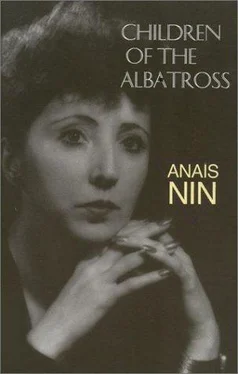Anaïs Nin - Children of the Albatross
Здесь есть возможность читать онлайн «Anaïs Nin - Children of the Albatross» весь текст электронной книги совершенно бесплатно (целиком полную версию без сокращений). В некоторых случаях можно слушать аудио, скачать через торрент в формате fb2 и присутствует краткое содержание. Год выпуска: 1959, ISBN: 1959, Издательство: Swallow Press, Жанр: Классическая проза, Эротические любовные романы, на английском языке. Описание произведения, (предисловие) а так же отзывы посетителей доступны на портале библиотеки ЛибКат.
- Название:Children of the Albatross
- Автор:
- Издательство:Swallow Press
- Жанр:
- Год:1959
- ISBN:9780804000390
- Рейтинг книги:4 / 5. Голосов: 1
-
Избранное:Добавить в избранное
- Отзывы:
-
Ваша оценка:
- 80
- 1
- 2
- 3
- 4
- 5
Children of the Albatross: краткое содержание, описание и аннотация
Предлагаем к чтению аннотацию, описание, краткое содержание или предисловие (зависит от того, что написал сам автор книги «Children of the Albatross»). Если вы не нашли необходимую информацию о книге — напишите в комментариях, мы постараемся отыскать её.
Children of the Albatross — читать онлайн бесплатно полную книгу (весь текст) целиком
Ниже представлен текст книги, разбитый по страницам. Система сохранения места последней прочитанной страницы, позволяет с удобством читать онлайн бесплатно книгу «Children of the Albatross», без необходимости каждый раз заново искать на чём Вы остановились. Поставьте закладку, и сможете в любой момент перейти на страницу, на которой закончили чтение.
Интервал:
Закладка:
Anaïs Nin
CHILDREN OF THE ALBATROSS

THE SEALED ROOM
STEPPING OFF THE BUS at Montmartre Djuna arrived in the center of the ambulant Fair and precisely at the moment when she set her right foot down on the cobblestones the music of the merry-go-round was unleashed from its mechanical box and she felt the whole scene, her mood, her body, transformed by its gaiety exactly as in her childhood her life in the orphan asylum had been suddenly transformed from a heavy nightmare to freedom by her winning of a dance scholarship.
As if, because of so many obstacles her childhood and adolescence had been painful, heavy walking on crutches and had suddenly changed overnight into a dance in which she discovered the air, space and the lightness of her own nature.
Her life was thus divided into two parts: the bare, the pedestrian one of her childhood, with poverty weighing her feet, and then the day when her interior monologue set to music led her feet into the dance.
Pointing her toe towards the floor she would always think: I danced my way out of the asylum, out of poverty, out of my past.
She remembered her feet on the bare floor of their first apartment. She remembered her feet on the linoleum of the orphan asylum. She remembered her feet going up and down the stairs of the home where she had been “adopted” and had suffered her jealousy of the affection bestowed on the legitimate children. She remembered her feet running away from that house.
She remembered her square-toed lusterless shoes, her mended stockings, and her hunger for new and shining shoes in shop windows.
She remembered the calluses on her feet from house work, from posing for painters, from working as a manneuin, from cold, from clumsy mendings and from ill-fitting shoes.
She remembered the day that her dreaming broke into singing, and became a monologue set to music, the day when the dreams became a miniature opera shutting out the harsh or dissonant sounds of the world.
She remembered the day when her feet became restless in their prison of lusterless leather and they began to vibrate in obedience to inner harmonizations, when she kicked off her shoes and as she moved her worn dress cracked under her arms and her skirt slit at the knees.
The flow of images set to music had descended from her head to her feet and she ceased to feel as one who had been split into two pieces by some great invisible saber cut.
In the external world she was the woman who had submitted to mysterious outer fatalities beyond her power to alter; and in her interior world she was a woman who had built many tunnels deeper down where no one could reach her, in which she deposited her treasures safe from destruction and in which she built a world exactly the opposite of the one she knew.
But at the moment of dancing a fusion took place, a welding, a wholeness. The cut in the middle of her body healed, and she was all one woman moving.
Lifted and impelled by an inner rhythm, with a music box playing inside her head, her foot lifted from drabness and immobility, from the swamps and miasmas of poverty, carried her across continents and oceans, depositing her on the cobblestone of a Paris square on the day of the Fair, among shimmering colored tents, the flags of pleasure at full mast, the merry-go-rounds turning like dervish dancers.
She walked to a side street, knocked on a dark doorway opened by a disheveled concierge and ran down the stairway to a vast underground room.
As she came down the stairway she could already hear the piano, feet stamping, and the ballet master’s voice. When the piano stopped there was always his voice scolding, and the whispering of smaller voices.
Sometimes as she entered the class was dissolving, and a flurry of little girls brushed by her in their moth ballet costumes, the little girls from the Opera, laughing and whispering, fluttering like moths on their dusty ballet slippers, flurries of snow in the darkness of the vast room, with drops of dew from exertion.
Djuna went down with them along the corridors to the dressing rooms which at first looked like a garden, with the puffed white giant daisies of ballet skirts, the nasturtiums and poppies of Spanish skirts, the roses of cotton, the sunflowers, the spider webs of hair nets.
The small dressing room overflowed with the smell of cold cream, face powder, and cheap cologne, with the wild confusion of laughter, confessions from the girls, with old dancing slippers, faded flowers and withering tulle.
As soon as Djuna cast off her city clothes it was the trepidating moment of metamorphosis.
The piano slightly out of tune, the floor’s vibrations, the odor of perspiration swelled the mood of excitement born in this garden of costumes to the accompaniment of whisperings and laughter.
When she extended her leg at the bar, the ballet master placed his hand on it as if to guide the accuracy of her pointed toe.
He was a slender, erect, stylized man of forty, not handsome in face; only in attitudes and gestures. His face was undefined, his features blurred. It was as if the dance were a sculptor who had taken hold of him and had carved style, form, elegance out of all his movements, but left the face unimportant.
She always felt his hand exceptionally warm whenever he placed it on her to guide, to correct, improve or change a gesture.
When he placed his hand on her ankle she became intensely aware of her ankle, as if he were the magician who caused the blood to flow through it; when he placed his hand on her waist she became intensely aware of her waist as if he were the sculptor who indented it.
When his hand gave the signal to dance then it was not only as if he had carved the form of her body and released the course of her blood but as if his hand had made the coordination between blood and gestures and form, and the lecon de danse became a lesson in living.
So she obeyed, she danced, she was flexible and yielding in his hands, plying her body, disciplining it, awakening it.
It became gradually apparent that she was the favorite. She was the only one at whom he did not shout while she was dressing. He was more elated at her progress, and less harsh about her faults.
She obeyed his hands, but he found it more imperative than with other pupils to guide her by touch or by tender inflections of his voice.
He gave of his own movements as if he knew her movements would be better if he made them with her.
The dance gained in perfection, a perfection born of an accord between their gestures; born of her submission and his domination.
When he was tired she danced less well. When his attention was fixed on her she danced magnificently.
The little girls of the ballet troupe, mature in this experience, whispered and giggled: you are the favorite!
Yet not for a moment did he become for her a man. He was the ballet master. If he ruled her body with this magnetic rulership, a physical prestige, it was as a master of her dancing for the purpose of the dance.
But one day after the lessons, when the little girls from the Opera had left and there still hung in the air only an echo of the silk, flurry, snow and patter of activities, he followed her into the dressing room.
She had not yet taken off the voluminous skirt of the dance, the full-blown petticoat, the tight-fitting panties, so that when he entered the dressing room it seemed like a continuation of the dance. A continuation of the dance when he approached her and bent one knee in gallant salutation, and put his arms around her skirt that swelled like a huge flower. She laid her hand on his head like a queen acknowledging his worship. He remained on one knee while the skirt like a full-blown flower opened to allow a kiss to be placed at the core.
Читать дальшеИнтервал:
Закладка:
Похожие книги на «Children of the Albatross»
Представляем Вашему вниманию похожие книги на «Children of the Albatross» списком для выбора. Мы отобрали схожую по названию и смыслу литературу в надежде предоставить читателям больше вариантов отыскать новые, интересные, ещё непрочитанные произведения.
Обсуждение, отзывы о книге «Children of the Albatross» и просто собственные мнения читателей. Оставьте ваши комментарии, напишите, что Вы думаете о произведении, его смысле или главных героях. Укажите что конкретно понравилось, а что нет, и почему Вы так считаете.












